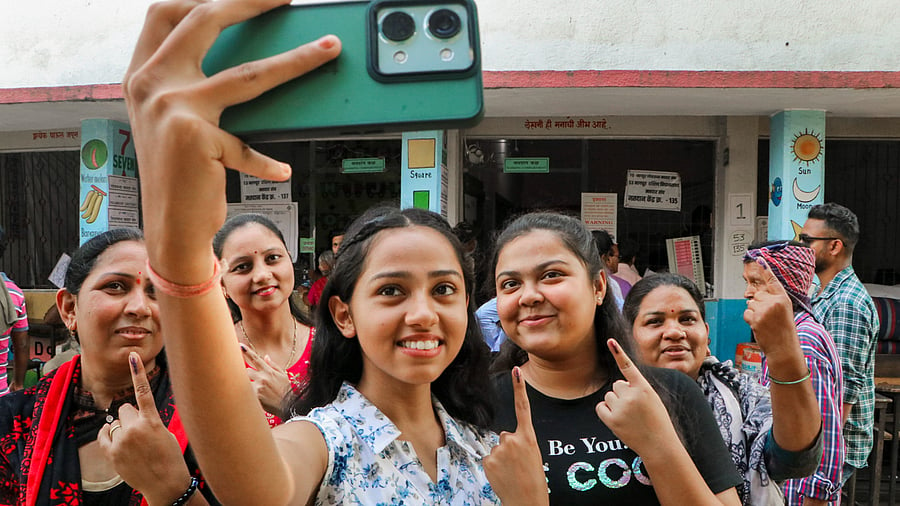
First time voters take selfie after casting votes for the first phase of Lok Sabha polls, 2024. Image for representational purposes.
Credit: PTI File Photo
On July 17, the United Kingdom’s Labour government announced that the voting age would be lowered from 18 years to 16 years by the time of the next general elections.
Proponents there argue that many young people start working from that age after completing their free and compulsory education, and should be enfranchised as taxpayers. Critics point that they won’t even be able to contest for elections they can vote in.
But we need to get to first principles. In this context, we need to note that the voting age for the assemblies in Scotland and Wales is already 16 years and that this change, the most consequential since the voting age was lowered from 21 years to 18 years in 1969, is part of electoral reform that is designed to make the exercise of franchise easier by expanding the list of documents accepted to enable voting, and moving towards automatic registration.
That’s the point, pernickety details about which party will gain and who can buy fags or booze, in the mix as well, are not what we should focus on. In a world in which liberal democracies, however flawed, are lurching towards authoritarianism and perfecting the playbook to suppress voting, any extension of the franchise is welcome.
In a 2021 article, David Runciman, then professor of politics at the University of Cambridge, made the radical case for the franchise to be extended to six-year-olds. He observed that historically the franchise has been denied to groups of people on the grounds of ‘competence’ and a paternalistic concern for shielding them from the harsh realities of life and that. The movement towards and the institution of universal adult franchise blew specious notions of fitness out of the water.
In the context of giving the vote to younger people – down to six or 16 – the most powerful argument for enfranchisement is intergenerational equity in the context of climate change. When the generations in control of states the world over are bent on crashing and burning the planet, younger people whose future is at stake must have a much greater role in electing governments.
From a broader perspective, we observe democracies — often reclassified as ‘elected’ autocracies or illiberal democracies — launch a concerted attack on the right to vote. In the US, this is said to have quickened after a Supreme Court ruling in 2013 that curtailed federal oversight, meant to ‘prescreen’ voting policies in jurisdictions with a history of racial discrimination. In 2021, after Joe Biden’s election, by March 24, more than 360 Bills to restrict voting rights were introduced across 47 states. Coloured voters were discriminatingly targeted. Between 2013 and June 2023, 29 states in the US passed 94 restrictive laws, some of which were blocked or repealed. But all 29 states retain at least one of these.
Given the claim, stridently made, that the US epitomises liberal democracy, which itself is the apotheosis of history, its broken political system gives us generous helpings of fear for civil and human rights.
The Elections Act 2022 introduced compulsory voter identification requirements in the UK despite the fact that ‘voter personification’ was practically non-existent, stoking concerns over the disbarment of eligible voters. The proposed liberalisation of the ID system is testimony to the iniquities of the system introduced. This, in the ‘mother of parliaments’!
In the ‘biggest democracy’ of the world, authoritarianism has been trumping liberalism, no pun intended, since Narendra Modi became prime minister. In addition to the debasement of procedures, undermining of institutions and the promotion of a sickening personality cult, the ruling Bharatiya Janata Party (BJP) appears to be now experimenting with voter suppression through the special intensive revision of electoral rolls. Minorities, and the poor and marginalised, will most probably be disproportionately deprived of their right to vote.
In India, what we need is greater enfranchisement through the institutionalisation of systems friendlier to citizen-voters. Towards this end, we could argue for a more statutorily independent election watchdog and an automatic voter registration system, facilitated now by the ubiquity of electronic surveillance technology and its deployment, supplemented by in-person registration, when the infrastructure fails. After all, it’s the State’s responsibility to ensure that all citizens get to exercise their constitutionally guaranteed rights.
The problem is that representative democracy has been hollowed out — even the procedural aspects that were privileged over substance are being attenuated. First, the citizen became the voter, now the voter is becoming a spectator. Enfranchising the young could be a route to igniting the kind of engagement that can redeem democracies.
Suhit K Sen is author of ‘The Paradox of Populism: The Indira Gandhi Years, 1966-1977’.